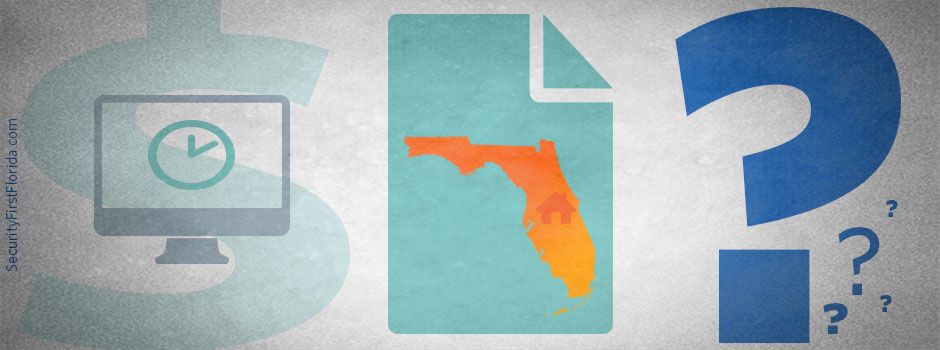14 Factors for buying Florida home insurance in 2014 (Part Two)
January 21, 2014

You've already had a chance to read four tips to help you get the most bang for your homeowners insurance buck. Here are 10 more suggestions to help you shop with savvy a Florida homeowners insurance policy.
5. It may not be “name brand” insurance – but that doesn’t mean it’s generic: After Florida’s 2004 multiple hurricane season, many of the larger national insurance companies began to reduce their exposure in the state. That opened the door for Florida “domestic” insurance companies (companies domiciled in the state that write primarily Florida property insurance). Not only do these carriers understand Florida’s unique and challenging marketplace, they also plan for multiple hurricane-event season and most are financially stable (some more than others). Domestic carriers currently insure about 70 percent of all property policies in Florida.
6. Reduce your odds: The steps you take to prevent claims by upgrading your home and making it more secure could result in reduced premiums for years to come.
7. Use the Goldilocks approach – make sure your coverage is “just right”: You don’t want to have too much or too little insurance (overestimating or underestimating the cost to rebuild your home or to replace your contents). It’s important to remember that insurance is based on the cost of rebuilding your home and not on real estate values. (Tweet This) Your insurance company has tools to help you determine your rebuilding cost, or you can use your favorite search engine to find a free home rebuilding cost calculator.
8. Reading is Fundamental: Okay, so it will never make the New York Times bestseller list, but you really should crack open your home insurance policy and give it a read. If you have trouble deciphering some of the jargon and legalese, call your agent and get clarification. It’s important to get an understanding of what your policy covers – and DOESN’T cover – before you ever need to file a claim. Keep your policy in a safe place and know the name of your insurance carrier.
9. An ounce of prevention is worth a pound of cure: Just as you must periodically perform oil changes and change the brakes on your car (without filing an insurance claim), it’s important to recognize the importance of conducting preventive maintenance on your home and repairing small problems quickly to help avoid more substantial losses down the road. Homeowners insurance is intended to help homeowners repair or replace property in the event of an unexpected major loss and not for assistance with home maintenance costs.
10. Deduce your deductible: A deductible is the amount you’re responsible to pay before your insurance company will cover the remaining costs for your damaged property. It’s important to know that most companies that offer insurance in coastal locations (such as Florida) offer a flat-rate deductible for all covered perils except hurricanes, which will generally be a percentage of your home’s insured value (usually between 2-5 percent). A higher deductible results in lower premiums – and greater out-of-pocket expenses in the event of a loss. (Tweet This)
11. Make your list – and check it twice: Prepare and maintain a list of your personal possessions and their estimated value. A thorough and up-to-date inventory list can save time and help you obtain the best possible settlement in the event you must file a claim. A written list is great, but an online home inventory (that can be accessed anytime, anywhere) is ideal.
12. When puppies attack: The personal liability protection available through your homeowners insurance policy covers medical payments, legal fees and any amounts a court orders you to pay to someone who was injured or whose property was damaged by someone in your household (human or animal). If the coverage available through your policy isn’t sufficient for your needs, consider additional coverage in the form of an "umbrella" policy. Increased liability coverage is especially important for homeowners with potential safety hazards, such as a swimming pool.
13. A lot can change in a year: The pool you had installed last summer or the latest electronic gadgets you received for Christmas – did you remember to share these updates with your agent? (Tweet This) Look for changes in the neighborhood that could reduce rates as well. A new fire hydrant or fire substation within close proximity to the property could result in lower premiums. The beginning of the year might be a great time to do an annual insurance check-up to make sure your policy provides adequate coverage.
14. Your insurance company could have changed, too: Your insurance company may have been “A rated” when you purchased your policy – but has its financial stability changed since then? A great time to check is around June 1st, a date by which most home insurance companies in Florida have purchased reinsurance for the upcoming hurricane season. If their reinsurance program seems inadequate, it could be a sign that they’ve poorly managed their growth and might not be able to pay claims in the event of a major storm.
Sign up below to receive helpful homeowners and insurance tips!
Subscribe Today
Enter your name and email address to have our posts emailed directly to your inbox.







